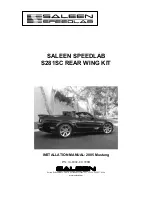
Towing with all wheels on the ground
G
Warning!
If circumstances require towing the vehicle
with all wheels on the ground, always tow with
a tow bar if:
R
the engine will not run
R
there is a malfunction in the brake system
R
there is a malfunction in the power supply
or in the vehicle’s electrical system
This is necessary to adequately control the
towed vehicle.
Prior to towing the vehicle with all wheels on
the ground, make sure the SmartKey is in
starter switch position
2.
G
Warning!
With the engine not running, there is no power
assistance for the brake and steering
systems. In this case, it is important to keep
in mind that a considerably higher degree of
effort is necessary to brake and steer the
vehicle. Adapt your driving accordingly.
X
Make sure the ignition is switched on.
X
With the vehicle at a standstill, depress the
brake pedal and keep it pressed.
X
Shift the automatic transmission into
neutral position
N.
X
Release the brake pedal.
X
If engaged, release the parking brake.
X
Switch on the hazard warning flasher
(
Y
page 101).
!
Keep in mind that it is important to have
the ignition switched on. Removing the
SmartKey from the starter switch or
opening a front door with the ignition
switched off will automatically shift the
automatic transmission into park position
P.
!
The vehicle may be towed only for
distances up to 30 miles (50 km) and at a
speed not to exceed 30 mph (50 km/h).
i
While being towed with the hazard
warning flasher in use, use the combination
switch in the usual manner to signal turns.
Only the selected turn signal will operate.
Upon canceling the turn signal, the hazard
warning flasher will operate again.
Stranded vehicle
Freeing a stranded vehicle, on which the
wheels are dug into sand or mud, should be
done with the greatest of care, especially if
the vehicle is heavily loaded.
Note the following when freeing a stranded
vehicle:
R
Avoid pulling the vehicle abruptly or
diagonally, since it could result in damage
to the chassis alignment.
R
Never try to free a vehicle that is still
coupled to a trailer.
R
If possible, a vehicle equipped with a trailer
hitch receiver should be pulled backward in
its own previously made tracks.
Fuses
Introduction
The electrical fuses in your vehicle serve to
switch off malfunctioning power circuits.
If a fuse is blown, the components and
systems secured by that fuse will stop
operating.
G
Warning!
Only use fuses approved by Mercedes-Benz
with the specified amperage for the system in
question and do not attempt to repair or
bridge a blown fuse. Using other than
approved fuses or using repaired or bridged
fuses may cause an overload leading to a fire,
and/or cause damage to electrical
components and/or systems. Have the cause
determined and remedied by an authorized
Mercedes-Benz Center.
340
Fuses
Practical hints
251_AKB; 4; 52, en-US
d2ureepe,
Version: 2.11.8.1
2009-03-23T09:22:52+01:00 - Seite 340
Summary of Contents for 2010 R-Class
Page 4: ...251_AKB 4 52 en US d2ureepe Version 2 11 8 1 2009 03 23T09 22 52 01 00 Seite 2...
Page 36: ...34 251_AKB 4 52 en US d2ureepe Version 2 11 8 1 2009 03 23T09 22 52 01 00 Seite 34...
Page 220: ...218 251_AKB 4 52 en US d2ureepe Version 2 11 8 1 2009 03 23T09 22 52 01 00 Seite 218...
Page 360: ...358 251_AKB 4 52 en US d2ureepe Version 2 11 8 1 2009 03 23T09 22 52 01 00 Seite 358...
Page 361: ...359 251_AKB 4 52 en US d2ureepe Version 2 11 8 1 2009 03 23T09 22 52 01 00 Seite 359...
Page 362: ...360 251_AKB 4 52 en US d2ureepe Version 2 11 8 1 2009 03 23T09 22 52 01 00 Seite 360...
















































